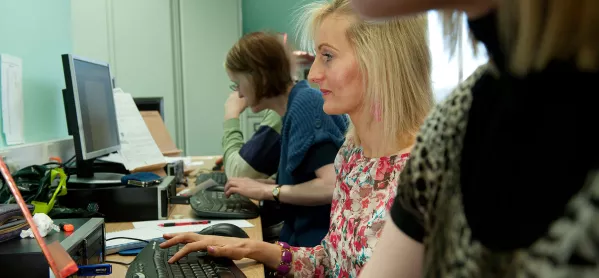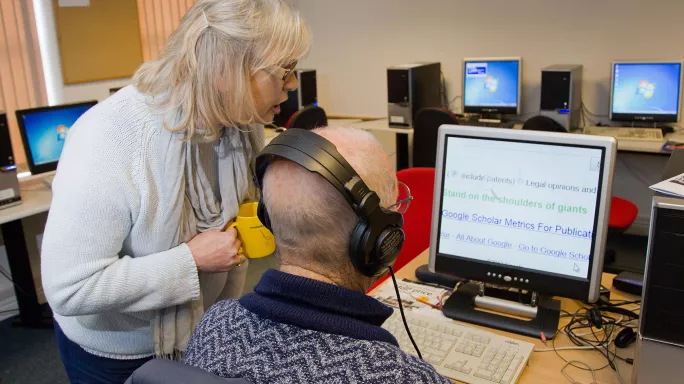- Home
- Community education is dead - but it was a lifeline
Community education is dead - but it was a lifeline

I was pleased to see the University of Oxford introduce an innovative new programme offering a free foundation year to students who have experienced “severe disadvantage or educational disruption” and are “not in a position to make a ‘competitive application’”.
The loss of opportunities for those who grow up in such situations has long been of concern to those of us who academically came of age in a very different, more socially aware society.
It is a relief to see some movement in the opposite direction.
Quick read: ’Engaging adults in learning is critical’
Quick listen: Doug Lemov on routines for learning
Want to know more? Progressive education: why it’s time to rescue its rep
But now, surely, it is time we paid attention to the lack of lifelong opportunities for over-21s, particularly with a view to the increasingly insecure gig economy in which people will be expected to work full-time until they approach their eighth decade.
Long before I was a reader in childhood, youth and education and even before I was a classroom teacher, I was a young mother in Thatcher’s Britain.
Thatcher’s policy for children under five was that they were their parents’ responsibility, so when my children were small, I became a sort of stay-at-home mum.
I say sort of because when my twins were two and a half, I started my first degree with the Open University (OU). And when I graduated, I began teaching adults in community education on a very part-time basis.

It is difficult to fully communicate the nature of adult education in the 1980s and 1990s. I had been schooled in an era when girls who grew up in London’s Docklands were not expected to apply to university.
Us typical top-set comprehensive school girls were encouraged to aspire to teacher training college or nursing, neither of which appealed to my 16-year-old self.
When I started studying with the OU a decade later, their degrees were still largely constructed within the Wilson government’s concept of a “university of the air”, as (amusingly but inaccurately) explored by Willy Russell’s Educating Rita (1980), and now vanished into history following the advent of the web.
Changing landscape
Accessing OU study was a far less expensive option in the 1980s and 1990s: as I remember, around £500 for 120 credits (around £1,500 for a whole undergraduate degree), which could be paid in interest-free instalments.
In the end, I did become a teacher, and over the past 25 years I have taught in schools, further and higher education, including 20 years as an associate lecturer with my alma mater, the OU.
But some of my very first teaching experiences took place in dusty church halls in the mid-1990s. The relationships I built with some of my first students turned out to be very much rooted in my identity as a fellow mum who knew a bit more about child psychology than them and was willing to share.
This would probably be viewed as highly unprofessional by today’s far more formal education culture, but it worked for us.
I had no idea at the time, but I was drawing upon some highly Frierian concepts:
- Dialogue: working with rather than on.
- Praxis: enhancing community and social capital.
- Developing consciousness to change the reality of both the students and of the educator.
- Attempting to educate from the perspective of being someone who is a part of a community, rather than somehow above it.
No assignment submission was required on these short courses, and students only had to pay a nominal sum.
This process of community education, which emerged from the social conditions accompanying industrialisation, was devised principally for people in deprived communities to come together, share an enjoyable experience and learn an unquantifiable something in the process, which may or may not lead to more formal education.
Targets and testing
But this became a poor fit with the targets and testing culture that began to permeate all sectors of English education after the launch of the national curriculum in 1989, which heralded a growing culture of accountability within all sectors that drew upon public funding.
Traditional community education, its culture of equality between teacher and students, and the acceptance that some students might just simply enjoy and be informally enriched by the experience, largely faded into the past, although some notable exceptions remain, for example in the award-winning work done by Northern College in Barnsley.
As a grandmother now, who managed to get all the way to PhD through this long and circuitous route, with one adult child who also achieved a PhD but via a far more direct and conventional route, the lack of affordable further and higher education for over-21s, and of a gentle, accessible route into such study, continues to trouble me.
For some, the results of an accessible, affordable chance in the post-21 stage of their lives not only enriched their future potential, but also permeated beyond the first generation.
Perhaps in the future, a National Education Service with a commitment to lifelong learning may create a renaissance for this much neglected sector?
Dr Pam Jarvis is a reader in childhood, youth and education at Leeds Trinity University
Keep reading for just £1 per month
You've reached your limit of free articles this month. Subscribe for £1 per month for three months and get:
- Unlimited access to all Tes magazine content
- Exclusive subscriber-only stories
- Award-winning email newsletters



